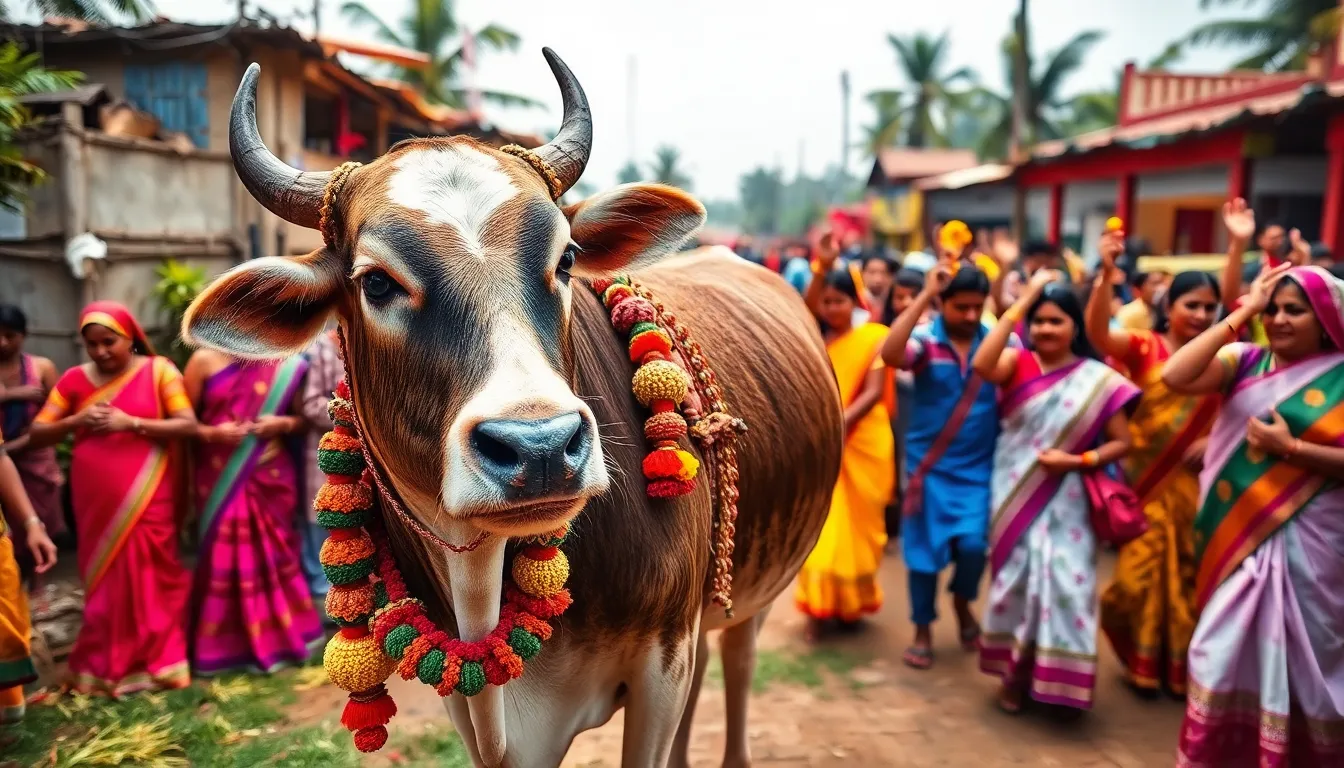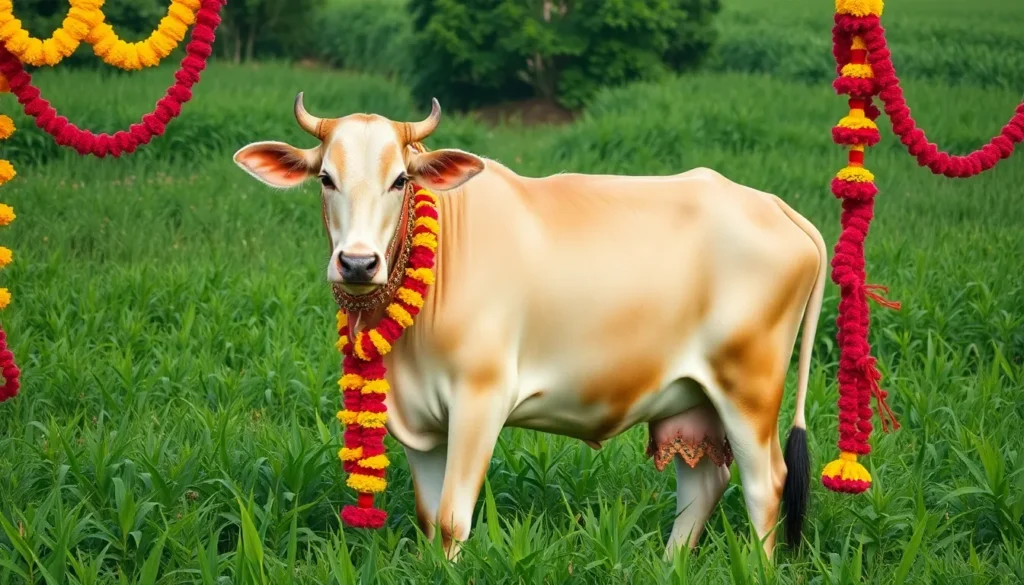Table of Contents
ToggleIn the heart of South India, a unique blend of culture, devotion, and a touch of humor comes alive through the figure of Gowthalamma. This beloved deity, often depicted as a nurturing cow, embodies the spirit of agriculture and prosperity. Imagine a goddess who not only blesses your fields but also keeps the neighborhood cows in check—talk about multitasking!
Gowthalamma isn’t just a figure of worship; she’s a symbol of community and tradition, bringing people together in vibrant festivals and rituals. With her charming persona, she reminds everyone that life’s blessings often come with a side of laughter. Dive into the enchanting world of Gowthalamma and discover how this divine cow has become a cherished part of countless lives, transforming ordinary days into extraordinary celebrations.
Overview of Gowthalamma
Gowthalamma, revered in South India, symbolizes nurturing and abundance. This deity, depicted as a cow, embodies agriculture and prosperity. Significant in various customs, she represents community bonds and traditional values.
Festivals honoring Gowthalamma celebrate her influence on daily life. Rituals often involve vibrant gatherings, showcasing joy and humor woven into these festivities. People come together to express gratitude, highlighting her role in fostering unity.
Cows, viewed as sacred animals, align closely with Gowthalamma’s depictions. Reverence for these animals reflects cultural practices, with many acknowledging their essential contribution to agriculture. Seasonal harvest celebrations further emphasize Gowthalamma’s blessings on crops and the well-being of families.
The narratives surrounding Gowthalamma include folklore and stories passed through generations. These tales illustrate her nurturing qualities and the transformative power of gratitude. Engaging in her worship connects individuals to heritage and shared values.
Communities participate in rituals, emphasizing their collective identity and spiritual beliefs. Gatherings around Gowthalamma promote togetherness and reinforce cultural significance. Rituals often adapt to local customs, ensuring her relevance across diverse regions.
Gowthalamma’s spirit extends beyond the divine, manifesting in daily life. She serves as a reminder of the importance of sustainable agricultural practices. These practices not only enhance community life but also contribute to environmental stewardship.
Historical Significance

Gowthalamma holds deep historical significance as a symbol of prosperity and nurturing in South Indian culture. Her portrayal as a nurturing cow connects her to agriculture, community, and tradition.
Cultural Context
Cultural festivities centered around Gowthalamma emphasize her role as a maternal figure. She represents rich agricultural heritage, embodying the relationship between humans and nature. Communities regard cows as sacred, highlighting their importance in daily life. Festivals also promote unity, drawing people together for collective gratitude. Local traditions vary, yet the reverence for Gowthalamma remains consistent, showcasing the interconnectedness of cultural identities. Through stories and songs, communities celebrate her influence, preserving their agricultural roots while fostering a sense of belonging.
Traditional Practices
Traditional practices honoring Gowthalamma include rituals performed during harvest times. People offer prayers, decorate cows, and organize communal meals to express gratitude. Festivities often feature colorful processions, where decorated cattle symbolize abundance and prosperity. Those involved participate in folk dances and songs, keeping cultural expressions alive. Local customs adapt to each region, ensuring that rituals resonate with community values. Practices surrounding Gowthalamma enhance agricultural sustainability, reminding participants of the responsibility they hold towards the environment. Her presence inspires hope and gratitude, symbolizing the intertwined relationship between community and nature.
Characteristics of Gowthalamma
Gowthalamma embodies distinct features that reflect her nurturing essence and cultural significance.
Appearance
Gowthalamma is typically depicted as a graceful cow, symbolizing purity and abundance. Her serene demeanor portrays strength and gentleness. Adornments, such as colorful garlands and traditional embellishments, enhance her sacred presence. Artists often capture her image in vibrant colors, emphasizing the joy she brings to the community. Statues and paintings frequently showcase her in lush, green fields, representing fertility and agricultural prosperity. Such representations reinforce her connection to nature and the agricultural cycles that sustain communities.
Personality Traits
Gowthalamma is revered for her nurturing spirit, reflecting compassion and kindness. She inspires gratitude and fosters deep connections among community members. Celebrated for her protective qualities, she symbolizes strength in times of struggle. Local tales often depict her as a wise figure, offering guidance and support to those in need. Her playful nature adds joy to festivals, allowing communities to celebrate life’s blessings. Many view her as a source of hope, encouraging sustainable practices that enhance community life. Through various rituals, her spirit remains intertwined with the lives of those who honor her, reinforcing loyalty and dedication.
Benefits of Gowthalamma
Gowthalamma offers various benefits that enrich both physical and mental well-being.
Physical Health
Engaging with Gowthalamma promotes physical health through the embrace of sustainable agricultural practices. Communities practicing these techniques often enjoy healthier food options, directly impacting nutrition and overall wellness. Rituals associated with her celebrations often include offerings of fresh, organic produce, contributing to dietary improvements. Additionally, the physical activity involved in festive preparations, such as decorating cows and participating in processions, enhances fitness levels. The emphasis on gratitude during these gatherings fosters a sense of connection to the land, encouraging healthier lifestyles.
Mental Health
The presence of Gowthalamma positively affects mental health by fostering communal harmony and support. Celebrations surrounding her encourage community bonding, reducing feelings of isolation and stress. Joyful festivities filled with music, dance, and shared experiences uplift spirits and create memorable moments. The nurturing image of Gowthalamma embodies compassion, serving as a reminder for individuals to practice kindness. Rituals often include moments of reflection, allowing participants to express gratitude, further enhancing overall mental well-being.
How to Care for Gowthalamma
Caring for Gowthalamma involves several essential aspects. Proper attention ensures her vitality and connection with the community.
Feeding Requirements
Nourishing Gowthalamma requires high-quality fodder that is rich in nutrients. Fresh grass, grains, and legumes contribute significantly to her diet, enhancing her strength and health. Farmers often supplement with mineral blocks and vitamins to ensure balanced nutrition. Providing clean drinking water throughout the day supports her hydration needs. Regular feeding schedules promote a sense of routine and well-being. Observing her appetite patterns helps detect any dietary issues early on. Ensuring diverse food sources enriches her dietary intake and boosts productivity.
Training Techniques
Training Gowthalamma incorporates positive reinforcement methods. Establishing trust through gentle handling fosters a strong bond between her and her caregiver. Gradual exposure to various environments helps her adapt smoothly to changes. Simple commands teach desired behaviors, making interactions easier and more enjoyable. Consistent training sessions ensure that she responds well to cues. Engaging her in various activities stimulates her mind and body, improving her overall happiness. Socializing with other animals enhances her confidence and social skills, promoting harmonious relationships within the community.
Gowthalamma embodies the essence of nurturing and community spirit in South Indian culture. Her influence transcends mere reverence for agriculture, fostering connections among people and promoting sustainable practices. Celebrations in her honor not only highlight the importance of gratitude but also enhance community bonds through shared experiences.
As communities come together to honor her, they reinforce values of kindness and compassion, ensuring that the spirit of Gowthalamma continues to thrive. Her presence serves as a reminder of the interconnectedness between nature and society, inspiring future generations to cherish and protect this vital relationship.




